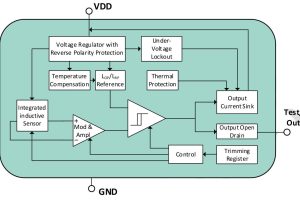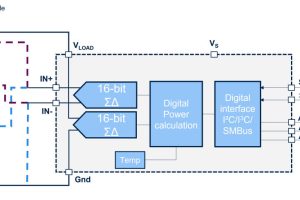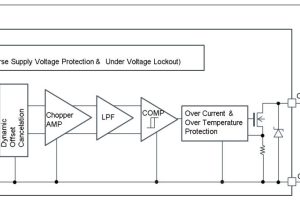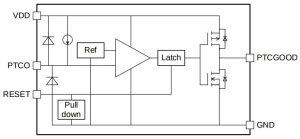
Each of these simple ICs, (branded ‘Thermoflagger’) works with one or more PTC (positive temperature coefficient) thermistors to detect over temperature across a PCB, for example, perhaps sensing the individual temperatures of multiple power mosfets .
“With safety paramount in many applications, the over-temperature detection ICs monitor internal temperatures to ensure that systems are working as intended, thereby ensuring safety,” according to the company. “Typical applications include mobile devices, home appliances and industrial equipment.”
They are not intended to implement precision temperature measurement, instead delegating accuracy to external PTC thermistors that have an intrinsic sharp knee in their temperature-resistance characteristic that sets the detection threshold.
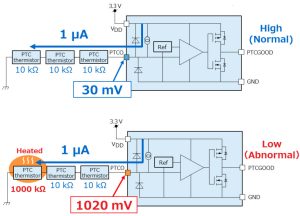 When multiple thermistors are used, they are wired in series
When multiple thermistors are used, they are wired in series
The result of a recent agreement, Murata has become Toshiba’s preferred thermistor company, and Murata now promotes Thermoflagger ICs for use with its thermistors.
Inside the ICs is a constant current source to drive the thermistor or thermistor string, and a comparator with its own voltage reference to detect when the thermistors have increased past their characteristic knee.
Options across the family were intended to be, and now are: latching or non-latching output, totem pole or open drain output, and 10μA or 1μA thermistor sense current – eight devices are planned to cover all the options.
The first two devices were both 10μA sense, open-drain types: the non-latching TCTH021BE and the latching TCTH022BE.
And now the family is completed with all eight possible combinations:
| TCTHxxxxE | PTC drive | Output | Output type |
| 011Ax = xxxx | 1μA | no latch | totem pole |
| 012A | 1 | latch | totem pole |
| 012A | 10 | no latch | totem pole |
| 022A | 10 | latch | totem pole |
| 011B | 1 | no latch | open-drain |
| 012B | 1 | latch | open-drain |
| 021B | 10 | no latch | open-drain |
| 022B | 10 | latch | open-drain |
Latching versions have a reset input (RESET) to clear the latch, while in non-latching versions this pad is labelled GND2 and needs to be grounded as the non-latching devices have an un-used reset circuit – or so Toshiba explained to Electronics Weekly after the initial introduction. “When GND2 is open or high level, the device may malfunction, so GND2 need to be on a low level the same as GND1,” it said.
IC operation is over -40 and +125°C and 1.7 to 5.5V, with consumption of a few microamps above the thermistor drive current.
Packaging is 1.6 x 1.6 x 0.55mm SOT-553.
The TCTH0xxxE family web page is here and there is an excellent application note, as well as an evaluation board, which adds the idea of using a light-dependent resistor instead of thermistors.
Find Murata’s PTC thermistors here
 Electronics Weekly Electronics Design & Components Tech News
Electronics Weekly Electronics Design & Components Tech News
